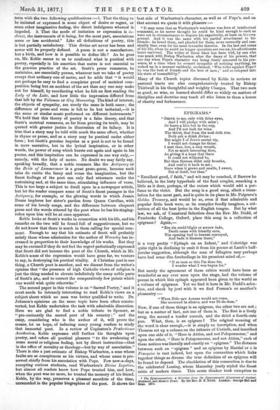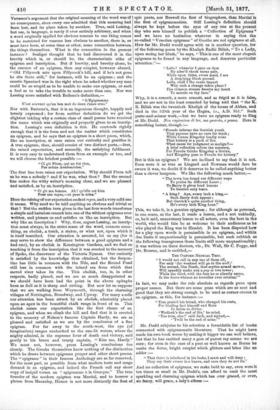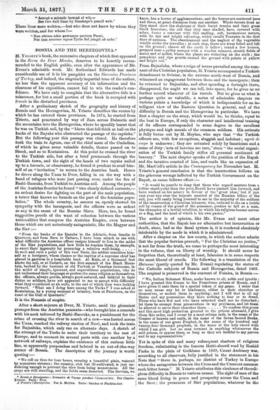EPIGRAMS.*
"DRINK to me, only with thine eyes,
And I will pledge with mine ; Or leave a kiss bat in the cup, And I'll not look for wine.
The thirst, that from the soul cloth rise, Doth ask a drink divine ; But might I of Jove's nectar sip, I would not change for thine.
I sent thee, late, a rosy wreath, Not so much honouring thee, As giving it a hope that there It could not withered be, But thou thereon didst only breathe, And sanest it back to me ; Since when it grows and smells, I swear, Not of itself, but thee."
" Excellent good, i' faith," and wit may be couched, if Barrow be believed, in the lusty hyperbole of the final couplet, smacking a little as it does, perhaps, of the excess which would add a per- fume to the violet. But the song is a good song, albeit a trans- lation for the most part, and is quite in its place in Mr. Palgrave's Golden Treasury, and would be so, even if that admirable and popular little book were, as its compiler fondly imagines, a col- lection of all the best lyrics in the English tongue. But by what law, we ask, of Unnatural Selection does the Rev. Mr. Dodd, of Pembroke College, Oxford, place this song in a collection of epigrams? Again,— "Ere sin could blight or sorrow fade, Death came with friendly care,
The opening bud to heaven conveyed, And bade it blossom there,"
is a very pretty "Epitaph on an Infant," and Coleridge was quite right in declining to omit it from his poems at Lamb's half- jocular suggestion, although the man of Islington may perhaps have had some dim forebodings in his prescient mind of,—
"If so soon as this I'm done for,
I wonder what I was begun for."
But surely the agreement of these critics would have been as wonderful as any ever seen upon the stage, had the volume of poems in which this epitaph appeared been given to the world as a volume of epigrams. Yet we find it here in Mr. Dodd's selec- tion, and cheek by jowl with it we find Porson's or another's pleasantry :-
" When Dido saw Aeneas would not come, She mourned in silence, and was Di-do-dam."
Now, if one of these things is an epigram, the other two are not ; but as a matter of fact, not one of them is. The first is a lively song, the second a tender conceit, and the third a fourth-rate pun. What, then, is an epigram P The original meaning of the word is clear enough, it is simply an inscription, and when Theseus set up a column on the isthmus of Corinth, and inscribed upon one side of it, "Here is Attica, and not Peloponnesus," and upon the other, " Here is Peloponnesus, and not Attica," each of these notices was literally and exactly an " epigram." The distance between such an " epigram " and an epigram by Martial or a is Frangaise is vast indeed, but upon the connection which links together things so diverse the true definition of an epigram will be found to depend. The elucidation of this connection is due to the celebrated Leasing, whom Macaulay justly styled the finest critic of modern times. This acute thinker took exception to * The Epigrammatists : a Selection from Me Epigrammatic Literature of Ancient, Medieval, and Modern Times. By the Rev. H. Dodd. London : George Bell sad Bone. 1876.
Vavassor's argument that the original meaning of the word was of no consequence, since every one admitted that this meaning had been lost, and its place taken by another. True, said Leasing, but use, in language, is rarely if ever entirely arbitrary, and when A word originally applied for obvious reasons to one thing comes to be restricted for reasons less obvious to another, there is, or must have been, at some time or other, some connection between the things themselves. What is the connection in the present instance? Scaliger thought that he had discovered it in the brevity which is, or should be, the characteristic alike of epigram and inscription. But if brevity, and brevity alone, be the essence of an epigram, then any couplet, however absurd, " Old Pillycock sate upon Pillycock's hill, and if he's not gone he sits there still," for instance, will be an epigram ; and the caustic Spaniard was in the right when he asked whether any man could be so stupid as to be unable to make one epigram, or such 41 fool as to take the trouble to make more than one. Nor was Leasing more satisfied with Boileau's definition,—
" L'Epigramme
Nest souvent Tenn bon mot de deux rimes ornd."
Nor with Batteux's, that it is an ingenious thought, happily and tersely expressed ; for from neither definition do we get the slightest inkling why a certain class of small poems have received the name which was originally and properly given to an inscrip- tion. Lessing's own definition is this. He contends rightly enough that it is the form and not the matter which constitutes an epigram, and he says that an epigram is a short poem, which, like an inscription, at once raises our curiosity and gratifies it. A true epigram, then, should consist of two distinct parts,—first, the raised expectation, and secondly, the satisfying fulfilment.
It is very easy to understand them from an example or too, and we will choose the briefest possible :—
"Ci git Piron, qui ne fat rien, Pas memo Aeademicien."
The first line here raises our expectation. why should Piron tell Ws he was a nobody ? and if he waS, what then ? But the second line makes fhe witty writer's meaning clear, and we are pleased and satisfied, at by an inscription. '" ti et ma femme. Alt ! Well° est bien Poi* son reposr,-et pour le mien."
litre the raising of our expectation ends at +-epos, and a very mild one -it teems. Why need we be told anything so obvious and trivial as that ? Bed the sudden tufa given in the last four words transforms a simple and harnileas remark into one of the wittiest epigrams ever
Written, and pleases us and satisfies us lfire an inscription. But why like an inscription ? Why, thus, argue% Leasing, an inscrip-
tion must always, in the strict sense of the word, connote some- thing, an obelisk, a tomb, a statue, or what not, upon which it is itself inscribed. Our attention is arrested, let us say (for it may serve to show the difference between a good epigram and a bad one), by an obelisk in Kensington Gardens, and we find on reaching it from the inscription that it was erected to the memory Of Speke, the discoverer of the Victoria Nyanza. Our curiosity is satisfied by the knowledge thus obtained, but the Serpen- tine has little in common with the Nile, and the Round Pond still less in common with the inland sea from which that
sacred river takes its rise. This obelisk, too, is, in other respects, badly placed, and we are as much disappointed as we should have been had the point in the above epitaphs been as dull as it is sharp and cutting. But now let us suppose that we are walking from Weymouth, through the charming villages of Nottington, Broadway, and Upway. For many a mile our attention has been struck by an obelisk, admirably placed upon an apex in the beautiful chalk range in front of us. This obelisk raises our expectation like the first clause of an epigram, and when we climb the bill and find that it is erected to the memory of Nelson's famous Captain Hardy, we are as pleased and satisfied as we are by the conclusion of a fine epigram. For far away to the south-west, the eye (of imagination) ranges unchecked to the sun-lit waters, where the mighty admiral, in the supreme hour of death and victory, said gently to his brave and trusty captain, " Kiss me, Hardy." We must not, however, press Lessing's conclusions too closely. The Greeks themselves knew nothing of the distinction which he draws between epigrams proper and other short poems. The " epigrams " in their famous Anthology are as far removed, for the most part, as possible from what modern taste and usage demand in an epigram, and indeed the French call any short copy of insipid verses an " epigramme is la Grecque." The true founder of the modern epigram was Martial, and to borrow a phrase from Macaulay, Homer is not more distinctly the first of epic poets, nor Boswell the first of biographers, than Martial is the first of epigrammatists. Still Lessing's definition should always be kept before the eyes of any one at the present day who sets himself to publish a " Collection of Epigrams" and we have no hesitation whatever in saying that the so-called " Venetian epigrams " of Goethe are not epigrams at all. How far Mr. Dodd would agree with us is another question, for of the following poem by the Khaliph Radhi Bfllah, " To a Lady, upon seeing her blush," he says, " This is one of the most elegant epigrams to be found in any language, and deserv'es particular attention :"—
" Leila! whene'er I gaze on thee My alter'd cheek turns pale, While upon thine, sweet maid, I see A deep'ning blush prevail. Leila, shall I the cause impart Why such a change takes place ? The crimson stream deserts my heart To mantle on thy face."
Why, it is a conceit, a mere conceit, and as frigid as it is false, and we are not in the least consoled by being told that " the K. R. Billah was the twentieth Khaliph of the house of Abbas, and died in the 329th year of the Hegira, i.e., A.D. 951." Such paste-and-scissor work,—but we have no epigram ready to fling at Mr. Dodd. Non ragioniam di lor, ma guarda, a passe. Here is something better, though :-
"Fronde informs the Scottish youth That parsons have no care for truth ; While Canon Kingsley loudly cries That history is a pack of lies.
What caul* for judgment so
A brief reflection solves the mystery, Por Fronde thinks Kingsley a divine,
And Kingsley goes to Fronde for history."
But is this an epigram? We are inclined to say that it is not. Even were it as true as Lin' gard and Newman would dare be sworn it was, we doubt if it deserves to be called anything better than a clever lampoon. We like the following much better,-
" The town has found out different ways
To praise its different Leers ; To Barry it &OS loud huszas To Garrick only tears.
"A king? Aye, every inch a ltinge=1. Such Barry doth appear ; But Garrick's quite another thing, He's every, inch Xing Lear?'
This, we take it, is a genuine epigram ; for although as personal, in one sense, as the last, it reads a lesson, and a not unkindly, or, be it said, unnecessary lesson to all actors, even the best in the world, who would fain be as welcome to their audiences as he who played the Ring was to Hamlet. It has been disputed how far a play upon words is permissible in an epigram, and within due limits it unquestionably is permissible, but such rubbish as the following transgresses those limits still more unquestionably; it was written on three doctors, viz., Dr. Wall, Sir C. Pegge, and Dr. Bonnie, and is entitled,— Tan °Limn MEDICAL TRIO.
" I would not call in any one of them all, For only 'the weakest will go to the wall;' The second, like Death, that soythe-armod mower, Will speedily make you a peg or two lower; While the third, with the fees he so silently earns, Is the bourn whence no traveller ever returns."
In fact, we may make the rule absolute as regards puns upon proper names. But there are some puns which are so neat and good that they are strong enough to be used as corner-stones to an epigram, as this, for instance :— " Tom prais'd his friend, who changed his state,
For binding fast himself and Kate In union so divine.
'Wedlock's the and of life,' he cried.
' Too trne, alas!' said Jack, and sighed,—
"Twill be the end of mine."
Mr. Dodd subjoins to his selection a formidable list of books connected with epigrammatic literature. That he might have made his own book worse by making it bigger we can well believe, but that he has omitted many a gem of purest ray serene we are sure ; for even in the case of a poet so well known as Burns he omits the fierce, bright couplet which glitters and bites like an adder :- "That there is falsehood in his looks, I must and will deny ;
They say their owner is a knave, and sure they do not lie."
And no collection of epigrams, we make bold to say, even were it ten times as small as Mr. Dodd's, can afford to omit the most sparkling and charming epigram which has ever graced, or ever, we fancy, will grace, a lady's album
" Accept a miracle instead of wit,--
glee two dull lines by Stanhope's pencil writ."
These lines were written,—but who does not know by whom they were written, and for whom 7— " Non obtuse adeo gestamus ;whirs Poeni, Neu tam aversus equos Tyria Sol jungit ab nrbe."




































 Previous page
Previous page